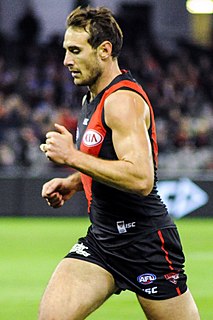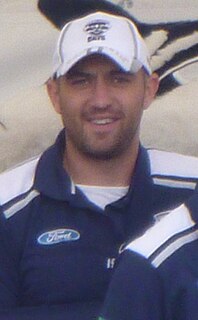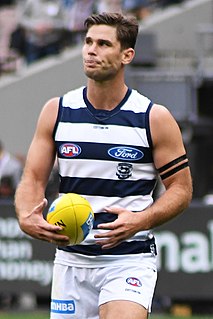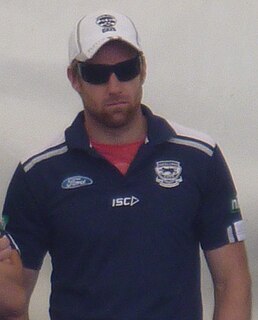Related Research Articles
James Albert Hird is a former professional Australian rules football player and past senior coach of the Essendon Football Club in the Australian Football League (AFL).

Mark "Bomber" Thompson is a retired Australian rules footballer and former senior coach. He played 202 games for the Essendon Football Club from 1983 to 1996, captaining the side from 1992 until 1995.

Jobe Watson is a former professional Australian rules footballer who played for the Essendon Football Club in the Australian Football League (AFL). Watson, the son of three-time Essendon premiership champion Tim Watson, was drafted by Essendon under the father–son rule in the 2002 national draft, and went on to become one of the best midfielders of the modern era. A dual All-Australian and three-time Crichton Medallist, he captained Essendon from 2010 to early 2016, and was the face of the Essendon playing group during the most turbulent period in the club's history.

Paul Chapman is a former professional Australian rules footballer who played for the Geelong Football Club and Essendon Football Club in the Australian Football League (AFL).

Matthew Egan is a former Australian rules footballer who played for the Geelong Football Club in the Australian Football League (AFL). He served as interim senior coach at the Essendon Football Club after the resignation of James Hird for the final three rounds of the 2015 season. He served as head of development at the Melbourne Football Club from September 2016 until 2020.

James Kelly is a former professional Australian rules footballer who played for the Geelong Football Club and Essendon Football Club in the Australian Football League (AFL).

James Podsiadly is a former professional Australian rules football player who played for the Geelong Football Club and the Adelaide Football Club in the Australian Football League (AFL). He was drafted by Geelong as a mature-age rookie at pick #50 in the 2010 rookie draft and was traded to Adelaide after the 2013 season.

Thomas John Hawkins is an Australian rules footballer playing for the Geelong Football Club in the Australian Football League (AFL). At 198 cm tall and weighing 110 kilograms (240 lb), Hawkins has the ability to play as either a full-forward or centre half-forward. He grew up in New South Wales before moving to Victoria to attend Melbourne Grammar School, where his football abilities earned him a spot in the first XVIII in year ten. He played top-level football with the Sandringham Dragons in the TAC Cup and Vic Metro in the AFL Under-18 Championships. His accolades as a junior include national and state representation, the Larke Medal as the AFL Under-18 Championships most valuable player, and All-Australian selection.
Andrew Lovett is an Aboriginal Australian rules footballer who played in the Australian Football League (AFL) for Essendon between 2005 and 2009. He was traded to St Kilda at the end of the 2009 season, but his contract was terminated in February 2010 before he ever played a game for the club.

Mathew Stokes is a former professional Australian rules footballer who played with the Geelong Football Club and the Essendon Football Club in the Australian Football League (AFL).

Tom Lonergan is a former professional Australian rules footballer who played for the Geelong Football Club in the Australian Football League (AFL).
The 2011 AFL season was the 115th season of the Australian Football League (AFL), the highest level senior Australian rules football competition in Australia, which was known as the Victorian Football League until 1989.

Dyson Heppell is a professional Australian rules footballer playing for the Essendon Football Club in the Australian Football League (AFL). Heppell won the AFL Rising Star award in his first season in 2011, and won a Crichton Medal and All-Australian selection in 2014. He has served as Essendon captain since the 2017 season.

The 2013 AFL season was the 117th season of the Australian Football League (AFL), the highest level senior Australian rules football competition in Australia, which was known as the Victorian Football League until 1989. The season featured eighteen clubs, ran from 22 March until 28 September, and comprised a 22-game home-and-away season followed by a finals series featuring the top eight clubs.
Stephen Dank is an Australian biochemist who worked as a sports scientist at several professional sports club. He is known for his key role in two major sports drug cheating scandals, the Essendon Football Club supplements saga and the Cronulla-Sutherland Sharks supplements saga, where he injected players with illegal substances to improve their performance.
The Essendon Football Club supplements saga was a sports controversy that occurred during the early- and mid-2010s. It centred around the Essendon Football Club, nicknamed the Bombers, a professional Australian rules football club based in Melbourne and playing in the Australian Football League (AFL). The club was investigated starting in February 2013 by the Australian Sports Anti-Doping Authority (ASADA) and the World Anti-Doping Agency (WADA) over the legality of its supplements program during the 2012 AFL season and the preceding preseason. After four years of investigations and legal proceedings, thirty-four players at the club were found guilty of having used the banned peptide Thymosin beta-4 and incurred suspensions.
The 2014 AFL season was the 118th season of the Australian Football League (AFL), the highest level senior Australian rules football competition in Australia, which was known as the Victorian Football League until 1989. The season featured eighteen clubs, ran from 14 March until 27 September, and comprised a 22-game home-and-away season followed by a finals series featuring the top eight clubs.
The Cronulla-Sutherland Sharks footy supplements saga was a sports controversy which began in 2011. The Cronulla-Sutherland Sharks, a professional rugby league club playing in the National Rugby League (NRL). The NRL later offered all five players a one-year ban, backdated to an effective six-month suspension, if they pleaded guilty to taking a banned substance. Sports scientist Stephen Dank provided sworn testimony about what involvement he had at Cronulla and which Staff and coaches were involved.
The 2017 AFL season was the 121st season of the Australian Football League (AFL), the highest level senior men's Australian rules football competition in Australia, which was known as the Victorian Football League until 1989. The season featured eighteen clubs, ran from 23 March until 30 September, and comprised a 22-game home-and-away season followed by a finals series featuring the top eight clubs.
References
- 1 2 3 McAsey, Jenny (28 September 2007). "Robinson who bucked the fitness trend". The Australian.
- 1 2 Edmund, Sam (9 December 2011). "Weapon of mass destruction – high-performance guru Dean Robinson". Herald Sun.
- 1 2 3 Baker, Grant (2 October 2014). "Dean "The Weapon" Robinson settles wrongful dismissal claim with Essendon for about $1 million". Herald Sun.
- 1 2 3 Wilson, Caroline (4 May 2013). "Dons' treatment of 'Weapon' a mystery". The Age.
- ↑ Gullan, Scott (16 September 2012). "Essendon and embattled fitness chief Dean Robinson make up on high-performance shake-up". Herald Sun.
- ↑ Walter, Brad (8 September 2010). "Paea heads to France with Robinson". The Sydney Morning Herald.
- ↑ Shields, Jason (7 February 2013). "Scandal shocks Geelong players". Geelong Advertiser.
- ↑ Thompson, Matt (5 February 2013). "Essendon's 'Weapon' stood down". AFL.com.au.
- ↑ Gullan, Scott (17 April 2013). "AFL investigators track every email sent by high-performance manager Dean Robinson since 2007". Herald Sun.
- ↑ Gordan, Michael (8 February 2013). "This is the blackest day in Australian sport". The Sydney Morning Herald.
- ↑ Chapman, Paul (27 April 2013). "Chappy: Why I back 'The Weapon'". Geelong Advertiser.
- ↑ Franklin, Ned (6 February 2013). "Dons will play in NAB Cup: Caro". 3AW 693 News Talk. Archived from the original on 9 February 2013.
- ↑ Staff Reporters (6 February 2013). "Essendon veteran Mark McVeigh backs the Bombers fitness program". Herald Sun.
- ↑ Pierik, Jon (10 December 2013). "Dean Robinson's legal action against Essendon could put heat on AFL executives". The Age.